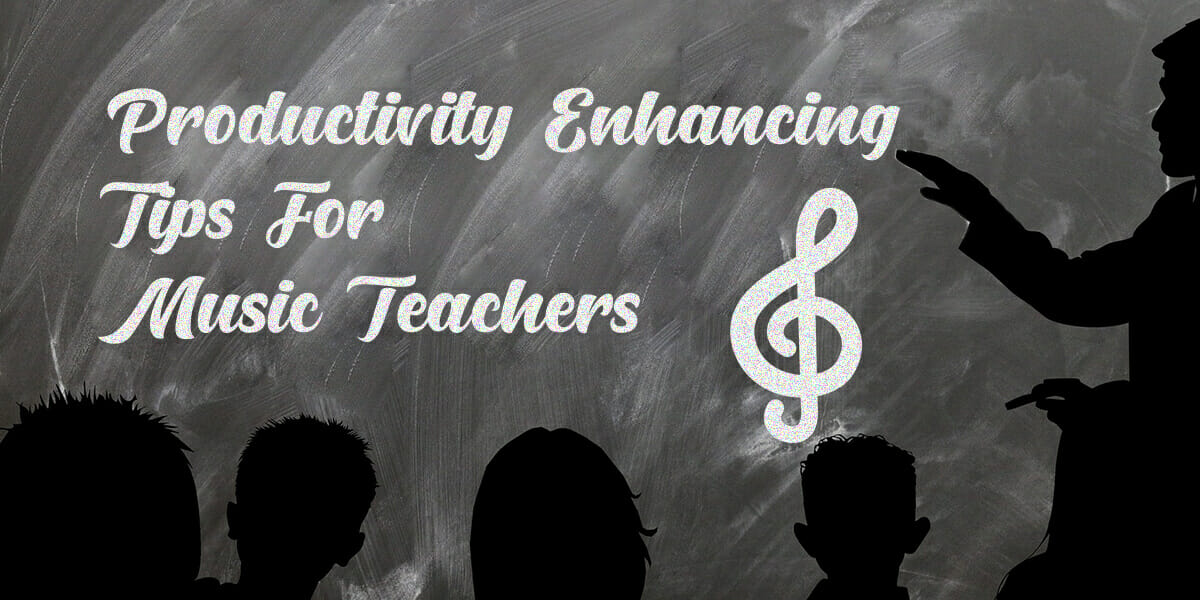
Music teachers often tend to get ignored compared to their other equivalents. Nonetheless, no one could deny them being the most dedicated educators putting their soul into the advancement of their students. Their field isn’t restricted to the genre they most prefer, but a blend of everything ranging from the ever-changing taste of students to the dynamic new trends in the industry and the constantly changing styles and instruments techniques. From tackling students’ behavioral issues to bridging the gap between the traditional and the vibrantly confusing modern, each day presents a new set of obstacles. If you are an educator, this could set you back in the very mission the profession seeks to accomplish, discernible progress.
Don’t worry though, you can guide yourself out of them just like you’re so used to doing with your students. Outlining your approach might help in the direction of enhancing your productivity as a professional and the five ways you could achieve them are listed below.
Table of Contents
- 1. Teach yourself before you teach others.
- 2. Stay updated and connect with your students.
- 3. Invest in instruments and own your collection.
- 4. Technology is key.
- 5. Professionalism IS Productivity.
1. Teach yourself before you teach others.
A music teacher is essentially a seasoned musician.
Teaching at a primary school or skilled hobbyists in high school, teaching traditional ensemble or vocal training or disclosing the techniques of production to tech savvy students, music teachers need to be constantly learning themselves to be able to impart the knowledge that brought them into this fabric.
Become your own coach. Inculcate that same passion in the lessons you give your students encouraging them at every point. You can only be inspiring if you’re highly motivated yourself. Remember, whether you are applying for one of the guitar teacher jobs online or anything else, you are a practitioner. Be an active learner and an engaged disciplinarian yourself.
2. Stay updated and connect with your students.
Let’s get one thing straight. Even though music involves the laws of physics, you don’t teach physics, do you? Fundamentals are indispensable to the knowledge of music, but you cannot be fundamental in your teaching. Let go of the reluctance to shift out of your comfort zone.
One of the signs of good music supervisors is them knowing they have to be different in their methods to continually enthrall students in the world of music. An important discussion of staying updated and not just being dependent on the known theories comes up here. Recall your own learning curve.
The old and established stays relevant owing to the constant adaptations it is subjected to and the various manners in which the same masterpiece influences different persons. Refine your credentials, engage your students, try to understand what they find interesting, then relate their particular inclinations with traditional sources of inspirations. No matter what you do, stay relevant.
3. Invest in instruments and own your collection.
For ensemble as well as fusion artists instruments can never be a bad investment. Build your own prized collection of musical equipment. Nothing inspires more than the determination to master your art, and instruments serve as the perfect- well… ‘instruments’ to help you achieve your goal.
Owning instruments serve multiple purposes of practicing yourself, demonstrating to your students and makes you even more of a professional as it shows you covet resources essential to progress.
Kids are creative enough to begin with and preschool musical instruments like the xylophone help them more from an early stage than you might think. Creating a work studio with equipment full, ready and accessible should be a priority.
4. Technology is key.
You seriously cannot teach music by old means and expect to gain that certain edge. Taking every feat online is taking it to another level, the pandemic has confirmed it even more so.
Boost your productivity by taking online video lessons using interactive music sites to make your teaching more resourceful. With multiple playlist storage options and music education platforms such as SmartMusic gaining popularity there is not a better time to switch to online mode to make teaching more convenient once you get the hang of it.
Online options also enable you to earn money through music more easily. You can find your own niche and students looking for what you have to deliver find you without nuisances.
5. Professionalism IS Productivity.
Balancing professionalism, innovation and engagement is a difficult task for music teachers. Remember these important points:
- You are a coach, a neo-conservative, a source of inspiration for your students.
- Commitment to your job is your most important qualification.
- Professionalism doesn’t need to be boring. Your fun element contributes to your integrity and work ethic.
- Be all things serious for a considerable standing in your field. Be punctual, make tough calls, believe in all your students.
- Your job is to get your students through the stagnant phases of learning and you possess the authority and expertise to do that.
- Professionalism doesn’t translate to arrogance, be humble to make your students respect the art.
Music teachers possess autonomy over their expression which is a valuable freedom. Don’t just be a glorified musician. This would mean to assess your own journey critically, take inputs from fellow educators and be objective to yourself. Make your professionalism evolve alongside you to consistently increase your productivity.

